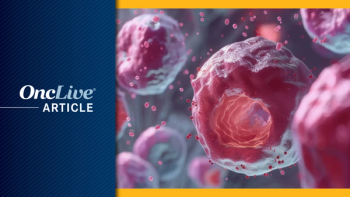
Investigation of Novel Management Strategies Continues to Mitigate Disease-Related Toxicities Across Hematologic Malignancies

Amy W. Zhou, MD, highlights the unique mechanism of action of the JAK1/2 and ACVR1 inhibitor momelotinib and the importance of ongoing investigations of JAK inhibitor combination therapies in myelofibrosis.
With the recent expansion of approved JAK inhibitors in myelofibrosis, research focus has shifted to exploring the sequencing and benefit of standard therapeutics such as ruxolitinib (Jakafi) and fedratinib (Inrebic) alongside novel or emerging agents such as pacritinib (Vonjo) and momelotinib (Ojjaara), which demonstrate potential for anemia improvement, according to Amy W. Zhou, MD.
“It's exciting that we have all these agents now for the treatment of patients with myelofibrosis and anemia because that is an area of unmet need. It's wonderful to see more options coming [down the pike] and hopefully [they will be] approved soon to help this patient population,” Zhou said regarding an OncLive® State of the Science Summit™ on hematologic malignancies, which she chaired.
In an interview with OncLive regarding this meeting, Zhou highlighted the unique mechanism of action of the JAK1/2 and ACVR1 inhibitor momelotinib and the importance of ongoing investigations of JAK inhibitor combination therapies in myelofibrosis.
Zhou also provided her perspective on key developments across hematologic malignancies as discussed by her colleagues at Washington University School of Medicine in St. Louis and the University of Chicago, including combination therapies under investigation for paroxysmal nocturnal hemoglobinuria (PNH), the potential role for hepcidin mimetics in polycythemia vera (PV),the optimal use of targeted therapies and bispecific antibodies in follicular lymphoma, and more.
Zhou is an assistant professor in the Department of Medicine, Division of Hematology, at Washington University School of Medicine in St. Louis, Missouri.
OncLive: How does the mechanism of action of momelotinib contribute to the agent's potential ability to ameliorate disease-related anemia?
Zhou: [The JAK inhibitor] momelotinib has an effect on ACVR1/ALK2 [receptors]. That's a different [mechanism] compared with agents like ruxolitinib or fedratinib, which don't have that target. That would be the explanation for why we see anemia benefit with momelotinib [as opposed to] with these agents. Pacritinib, which is the other JAK inhibitor that's currently FDA approved, also targets ACVR1. There has also been anemia benefit seen with this agent.
What could combination therapies with ruxolitinib potentially contribute to the treatment paradigm?
Some of these combination therapies [contain] pelabresib [CPI-0610], [such as the regimen] evaluated in the phase 2 MANIFEST trial [NCT02158858]. [Investigators are] looking at it as upfront therapy in combination with ruxolitinib. We'll have to see whether the combination therapy is more effective than ruxolitinib alone from the phase 3 [MANIFEST-2 (NCT04603495) study]. [However], [pelabresib] certainly has a role in patients who are refractory or lose response to ruxolitinib [based on data] from the phase 2 studies. It seems like the addition of [pelabresib] produced additional spleen and symptom response. These combination therapies have a role for patients who did not have an optimal response to JAK inhibitors. As far as whether we're going to see them used in the frontline setting, we'll see what the phase 3 study show. It's important to be able to have that comparison, and have a phase 3, randomized, control trial demonstrating whether the combination therapy is more effective than single-agent therapy.
Regarding the presentation given by Elaine Majerus, MD, PhD, on treatment updates in paroxysmal nocturnal hemoglobinuria (PNH), what experimental complement therapies are showing promise in this space?
The more proximal complement inhibitors, like C1 inhibitors, are promising therapies for patients who are not responding or lose response to the C5 inhibitors. These therapies seem to be very effective, so we're now looking at how to improve patients' quality of life in regard to the administration of the drug. These newer formulations that can be administered subcutaneously at home could be good for certain patients who don't want to come to the clinic every 8 weeks for an infusion. Iptacopan, the oral agent that's being evaluated, is also going to be a good option for patients who want more convenience as far as therapies that they can take at home.
Shifting to the presentation given by Peter Riedell, MD, what patient factors might influence the navigation of currently available CAR T-cell therapies and bispecific antibodies in relapsed/refractory follicular lymphoma?
It seems like the bispecific therapies are well tolerated and easier to administer than CAR T-cell therapy, so [bispecific therapies are] a good option for patients. Dr Riedell brought up a good point in regard to the sequencing of these therapies. If you have a patient who can receive CAR T-cell therapy and they have time to wait for production of that CAR T-cell product, [that can inform] how to sequence these therapies.
Could you expand on the potential advantages of utilizing rusfertide (PTG-300) for patients with phlebotomy-dependent PV, as discussed by Stephen Oh, MD, PhD?
The benefit of hepcidin over phlebotomy would be that patients don't have to deal with the side effects of phlebotomy, such as iron deficiency. That is purposely created to suppress patient blood counts. Some patients don't have any symptoms from the iron deficiency, [whereas] some patients do have ice pica and restless leg syndrome. There's a role for these agents in patients who are not tolerating phlebotomy well. As far as these other therapies available for PV, like ruxolitinib and ropeginterferon alfa-2b [Besremi], we're always happy to see more treatment options. It then becomes a question of how to sequence these therapies, and at what point we really want to focus on disease modification for our low-risk patients with PV, who are generally receiving phlebotomy alone without cytoreductive agents. Decreasing their phlebotomy requirements and keeping their blood counts at goal should help with decreasing patients' thrombotic risk, but whether it's doing anything to their blood cancer itself is unclear. Whether or not these hepcidin mimetics have any disease modifying properties may be their limitation if we're trying to improve long-term outcomes in our low-risk patients with PV.
What unmet needs still exist regarding the management of cancer-associated thrombosis according to the presentation given by Kristen Sanfilippo, MD, MPHS?
There's a lot of unmet need regarding the implementation of thrombosis prophylaxis, especially now that we're looking at agents that potentially have even less bleeding risk than the DOAC [direct oral anticoagulant] therapies. There's definitely a need for education [about] thrombosis prophylaxis for this patient population that we know is at a higher risk for [developing] blood clots.
With the recent FDA approval of avapritinib (Ayvakit) in indolent systemic mastocytosis (SM), how could this agent benefit patients in clinical practice, as per the presentation by Sana Saif Ur Rehman, MD?
The much lower dose of avapritinib was used for indolent SM compared with its prior approval for advanced SM. The phase 2 PIONEER trial [NCT03731260)] demonstrated that even at a lower dose, [avapritinib] seems to be effective at improving the [toxicities] associated with indolent SM, which is generally the biggest issue for this patient population. It looks like it's a well-tolerated and effective therapy. As far as the utilization of this agent, it'll be interesting to see how much of it is prescribed by non-hematologists, because allergists and dermatologists probably see a number of patients with indolent SM. Given the good tolerability of the lower dose, we may see that other specialties will be prescribing this [agent] as well.
Please highlight any key research in hematologic oncology that is being conducted at Washington University School of Medicine.
We have several trials in myelofibrosis. Right now, we're participating in the [phase 1/2 study (NCT04455841) of INCB000928 with or without ruxolitinib] for patients with anemia and myelofibrosis. We also recently opened a [phase 1/2 study (NCT05320198)] with the anti-hemojuvelin agent [DISC-0974] that lowers hepcidin for patients with anemia and myelofibrosis. In addition to what might be FDA approved soon, I want to highlight that we have some clinical trials looking to help with anemia in the myelofibrosis population.



































